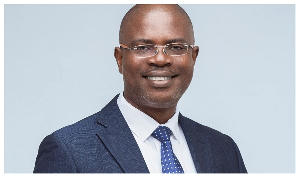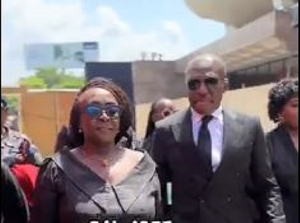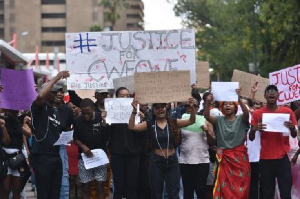Even as the Castle persists in its support for Mr.Alan Kyeremanten, the Minister of Trade, industry and Presidential Special Initiative to the growing discomfiture of at least four of the cabinet Ministers who were forced to resign, Chronicle has learnt of heated documentary exchanges between the Minister, and Messrs Kwesi Arthur at the Commission on Human Rights and Administrative Justice (CHRAJ).
The exchanges are over the acts of wrongdoings which is the highpoint of Mr. Kwesi Arthur’s ‘bill of indictment’ against the Minister at the Human Right Commission.
With the National Democratic Congress (NDC) lapping at the huge drama that is unfolding at the Commission which has begun investigating the Minister, the wisdom of supporting such a candidate to be the standard bearer of the New Patriotic Party (NPP) is being seriously questioned since many belief that doing so is tantamount to handing over the reins of Government to the opposition NDC.
Alan is marked out as the candidate with ‘cloven hoofs’ with him emerging as the standard bearer to do battle against the NDC’s Atta Mills/Betty Mould Iddrissu in 2008, is just what the NDC would be is praying for. The CHRAJ exchanges have been fierce with Allan.
THE CHRAJ EXCHANGES
All seem set for the Commission on Human Rights and Administrative Justice (CHRAJ) to launch a full-blown investigations into the petition filed by Mr. Kwesi Arthur, a former Board Member of the Export Development and Investment Fund (EDIF) citing the Minister of Trade, Industry and President Special Initiatives (PSI) for a number of alleged wrong doings.
Both parties have since filed documentations necessary for the commencement of the quasi-judicial investigations by the human rights institution.
In May this year, Mr. Arthur filed the complaint against the Minister and the Director of Finance and Human Resource Development at the Ministry of Trade, Mr. A. S. Bekoe, citing them for alleged acts of impropriety in the management and administration of EDIF. Mr. Arthur grounded his petition on Article 218 (a), (d), (iv) and (e) of the 1992 constitution and on sections 1 (a) (b) and (d) of the Whistleblower Act, 2006 (Act 720).
Subsequent to the petition, Afari Yeboah and Associates, solicitors of the Minister filed a 27-page response to the petition, debunking the allegations made against the Minister and the Chief Director.
In their petition, they highlighted the point that under the EDIF Act 2000, (Act 582) all funds to EDIF are under the Direct Control of the EDIF Board and the Minister has no absolute control over how the funds should be run.
Alan’s response to the petition after pointing out the responsibility of the Board over the management of funds then went on to argue over the controversy surrounding an amount of ¢32billion that was given to the Ministry of Trade and Industry (MOTI) at the request of Mr. Bekoe who signed for the sector Minister.
The Minister stated in the petition in his defence that monies under EDIF were meant for investments that would yield maximum benefit and the ¢32billion was meant for PSI’s, which were to the benefit of the nation.
It continues that with regard to the ¢32billion, the Board of EDIF took certain steps, which confirms that they were not under the control of the Minister.
The amount in contention was for the refurbishment of former GNTC properties at Adjabeng, in Accra by some private companies.
Submissions of both parties points out that the Ministry had applied for the money as a grant but in the end it was given as an interest-free loan and this is one factor the defence of the Minister relies on to say that the Board was independent.
Additionally, the Minister’s response to the original petition points out that before the amount of ¢30billion (out of the ¢32billion applied for) was released as interest-free loan instead of a grant to MOTI, the EDIF board had deliberated on the application thoroughly and had even sought the legal opinion of the then Attorney General who then spelt out conditions under which the monies could be granted.
The response thus states, “It is therefore, our humble submission that if there is any illegality in respect of the payment of the amount out of the grant fund, then the illegality was committed by the first EDIF Board of which the petitioner was a member and who were all material times, the custodians in all respects de facto and de jure of the accounts of the fund.”
In Mr. Arthur’s petition, he alleged that the entire Adjaben warehouse could have been rebuilt anew at the cost of not more than ¢4.7billion to which Alan responded that the allegation has no basis whatsoever and there was no evidence to support it.
Alan also denies in his response that he dissolved the old EDIF Board by himself, saying it was an action taken by President Kufuor.
On the issue of conflict on interest raised by the petitioner, the Minister and his Director’s response was that the allegation was raised out of share ignorance of what constitute conflict of interest on the part of the petitioner.
The minister’s petition insisted that Mr. Bekoe was just a member of the Board representing MOTI and so could not have controlled the Board as was being suggested by the petitioner, to raise the issue of conflict of interest. On the issue of the appointment of Mr. K. M. Nkrumah as Director of Credit and Acting Chief Executive of EDIF, the Minister contends that he cannot be accused in any way because Mr. Nkrumah was appointed by the same Board.
“Indeed, the petitioner was a member of the sub-Committee of the board which interviewed Mr. Nkrumah,” the response stated and added that the allegation reinforces “the bad faith of the petitioner.”
Further, Alan dismissed the charge of ‘causing financial loss to the state’ and rather accuses the petitioner of that offence. Responding to the Minister’s response to his initial petition to CHRAJ, Mr. Arthur reaffirmed his conviction that the Minister and his Director had committed certain offenses.
In a 13-page response clipped together with 18-page appendixes, the petitioner flatly denies the assertion that the Minister did not have control over the EDIF Board, citing a comment in his own press release following the publications of the petition to CHRAJ to back his case.
In the said comment, the Minister pointed out that through the intervention of his Ministry, a pilot project on post harvest losses that was being executed by the EDIF Board was aborted and this, the petitioner points to, as an affirmation of the point that the Minister could influence the activities of the Board.
Further, Mr. Arthur stressed that there was wrongdoings on the part of the Minister and his Director since the Board Chirman of EDIF, Mr. J.B Addae did sign a letter indicating approval of the interest-free loan but stressed in that letter that, “before the approved amount is released in full, the Ministry would be required to sign an agreement with the Fund covering the purpose and scope of the facility.”
“The respondent (Alan and Bekoe) requested and obtained the release of the funds, by the Chief Executive without signing any loan agreement which was a condition precedent to disbursement of the facility,” he added to buttress his conviction that the Minister had acquired the facility wrongfully.
To further affirm his complaint that the Minister and Director got the ¢30billion wrongfully, Mr. Arthur emphasized, “In the history of EDIF all credit facilities were approved by the Board upon the application of a designated financial institution (DFI) in strict compliance with the provisions of sections 14 and 15 of the EDIF Act.
There has never been a single instance where the Board gave a loan to any entity or institution, which did not apply for one through a DFI, with only two exceptions, the first to PSI Properties Limited, a company owned by the first Respondent (Alan) and the second to the Ministry headed by first respondent,”
He therefore stressed that the granting of the interest free loan to MOTI was therefore in contravention of the EDIF Act and the Board acted that way because of severe pressure from the Minister through the Director.
Also, he raised questions about a Destination Inspection Account (DIA) into which the money was paid; that is a Bank of Ghana Account No. 01256-600-770-63, challenging the respondents in the case to answer specific question that would prove that the account was a DIA.
Mr. Arthur further challenged the response filed by the respondents on allegations he made concerning facilities granted to Empretec0, appointment of the Acting Chief Executive of EDIF among others.
In conclusion, he made reference to the Directive Principle of State Police in the constitution and emphasized that his petition has been motivated by his commitment to uphold and protect public interest.
General News of Tuesday, 10 July 2007
Source: The Chronicle












